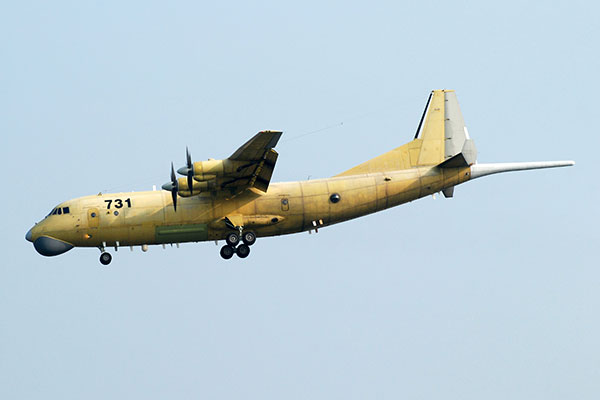Navy gets anti-sub boost
 0 Comment(s)
0 Comment(s) Print
Print E-mail China Daily, July 7, 2015
E-mail China Daily, July 7, 2015
China has developed and commissioned a fixed-wing, anti-submarine patrol aircraft, which will significantly boost the Chinese navy's operational capability, experts said.
 |
|
The navy has updated its fixed-wing anti-submarine patrol aircraft with the Gaoxin-6. Provided to China Daily |
The four-engine Gaoxin-6, which was developed and manufactured by Aviation Industry Corp of China based on the Y-8 transport plane, has been delivered to the Beihai - or North Sea - Fleet of the People's Liberation Army navy, about three years after the type was first revealed in late 2011, according to a recent report in IHS Jane's Defense Weekly, a United Kingdom-based weapon technology publication.
The aircraft can easily be distinguished from other Y-8 variants by its large sea-search radar, mounted below the cockpit, and the magnetic anomaly detector boom that looks like a metal tail.
It is China's first large aircraft specifically designed for anti-submarine warfare, making the country the sixth nation that has the development capability for such a sophisticated plane. The others are the United States, Russia, Japan, the UK and France.
The most-deployed anti-submarine aircraft is the US' Lockheed P-3C Orion, which often appears in naval confrontations between the US and China. Almost all US allies have P-3Cs as the backbone of their anti-submarine forces.
Earlier reports by Chinese media said the Gaoxin-6, with a crew of up to 10, is capable of flying 6,000 kilometers or staying in the air for more than eight hours.
"Prior to the Gaoxin-6, the PLA navy only had a handful of the antiquated SH-5 maritime patrol amphibious aircraft and some ship-borne helicopters when it needed to deploy air platforms in anti-submarine operations," Wang Ya'nan, deputy editor-in-chief of Aerospace Knowledge magazine, told China Daily.
"That situation had hugely confined the PLA navy's long-range combat capability because foreign navies' submarines are probably the most dangerous threat to its fleets."
Therefore, the addition of the Gaoxin-6 will extensively enhance the navy's anti-submarine power while facilitating its maritime patrols and reconnaissance, he said.
Yin Zhuo, director of the PLA navy's Expert Consultation Committee, said that the plane's magnetic anomaly detector, radar, sonar and torpedo are as good as those on the P-3C.
"In addition to anti-submarine tasks, the aircraft is able to perform anti-ship missions if it carries anti-ship missiles. It can also guide missiles launched from ships to strike targets," he said.
However, because it is designed based on the old Y-8 transport plane, the aircraft lags behind the US' most advanced Boeing P-8 Poseidon in terms of flight range and operational endurance.
Li Jie, a senior expert at the Naval Military Studies Research Institute, told Hong Kong newspaper South China Morning Post: "Both Japan and South Korea have the world's most advanced submarines in the waters of the Yellow Sea and the East China Sea. That's why the navy decided to deploy the Gaoxin aircraft to the North Sea Fleet first."






Go to Forum >>0 Comment(s)